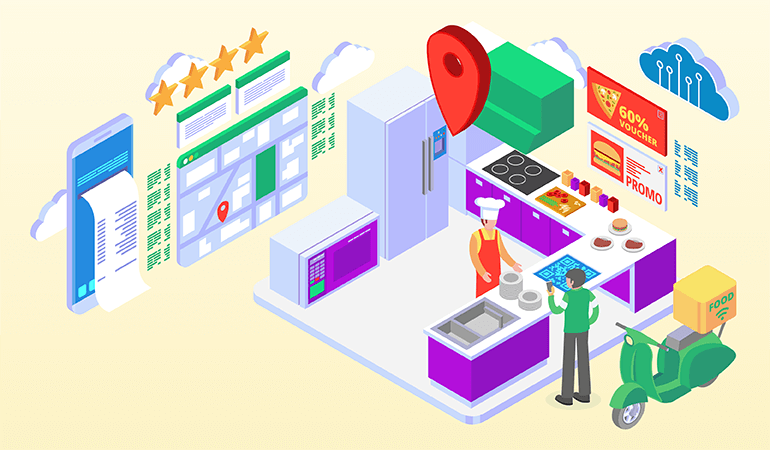Here’s the thing — this was supposed to turn into a be-all-end-all post on the topic of cloud kitchen business models.
At least, that was the plan until I hit the research equivalent of a brick wall.
The fact of the matter is that cloud kitchen business models are still evolving. They are a smörgåsbord of moving parts, pivots, and changes.
I counted anywhere between 20 and 40 different iterations of the concept. And what’s making the situation more muddled is the fact that some operators are transitioning between concepts (and sometimes back).
I found ghost kitchens that are:
- Brand-owned, with self-delivery, no partnerships, and takeaway…
that turn into… - Brand-owned, with self-delivery, aggregator partnerships and no takeaway…
that morph into a… - Shared kitchen with a mix of self-delivery and aggregator partnerships.
And on and on it goes. This adds up, trust me.
Just so you know, you might see different names pop up. Don’t let them confuse you. Cloud kitchen, dark kitchen and ghost kitchen are synonyms. They all mean the same thing. It’s a food production unit built exclusively for, and optimised for, food delivery. There is no dine-in area.
So… why are there so many different types of ghost kitchens?
Well, blame the ‘amazonification’ of consumer experience and the concept of last-mile delivery.
Consumers want everything right this minute, which gave rise to aggregator and delivery platforms. It also pushed restaurants to invest in their own delivery fleets. Couple that with the fact that fast delivery can only be profitable if it’s also a short run delivery (a couple of kilometres, at most), and you get a lot of business model experimentation.
Restaurants that add delivery to their offer; restaurants that open pop-up stores to be able to service a particular area; aggregators that break into the restaurant business grow profits…
It’s a Wild West situation.
Oh, and did I mention the global pandemic? It really accelerated the rise of ghost kitchens.
This begs the question: are ghost kitchens a sustainable business model?
The answer is less straightforward.
While this obviously can’t be the ‘ultimate guide’ it still packs everything there is to know about the cloud kitchen game, to date.
You’ll walk away with an in-depth understanding of:
- 6 main cloud kitchen models
- How they work
- How difficult to scale they are, and
- How profitable you can expect each one to be.
And we’ll start with the OG of cloud kitchens… the pureblood cloud kitchen.
Recommended Reading: How Will Off-premise Dining Evolve in Europe?
Cloud Kitchen Model #1 – Brand-Owned Cloud Kitchen
This is as clean-cut as cloud-kitchen models get.
One location. One brand. One kitchen. A brand-owned single-cuisine ghost kitchen is a delivery-only operation, with no takeaway and no dine-in.

Typical setup: The kitchen is usually located in a lower-end rent area but not too far from densely populated spots.
It’s relatively small and streamlined and employs a skeleton crew. Orders and deliveries are handled by several different aggregators to maximise exposure. Sometimes, the kitchen parallelly operates self-delivery, especially if it’s a well-known brand.
Profit potential: ★★★★
Upfront investment — low. This is true if we’re talking about a new entrant that’s choosing between a dine-in restaurant and a cloud kitchen. A cloud kitchen is always a less substantial investment. However, an owner of a dine-in restaurant is often better off running a joint dine-in/cloud kitchen operation, at least until they’ve tested out their concept and the demand.
Business scaling — doable with effort. The best scaling tactic requires a slight tweak in the model — expanding the original operation and creating a centralised kitchen. The brand can then cover more ground through pop-up locations while keeping costs under control.
Recommended Reading: Best Kitchen Management Software for Multi-Unit Restaurants
Cloud Kitchen Model #2 – Dine-in With a Separate In-Location Delivery Production Line
In this cloud kitchen model, an existing dine-in restaurant creates a side-hustle dedicated to delivery/takeout. Basically, the restaurant takes its menu hits and tweaks them for delivery.
Despite appearances, most of these cloud kitchens are not thrown up ad hoc — there’s a system behind how this is done.

Typical setup: The kitchen is located in a high-rent, frequented area. The delivery side of the operation is almost exclusively geared towards creating an additional revenue stream. Sometimes, it’s a measure to bridge a cash flow problem or a way to test out new menu ideas and concepts.
Dine-in and delivery production lines are separated, with similar (but different) menus. The restaurant partners with a few aggregators to handle orders and delivery (but can also run its own delivery).
Profit potential: ★★★
Upfront investment — low. In a pinch, most existing restaurants can pull this off to increase volumes and stave off layoffs and financial ruin. This is why it’s so popular as a stop-gap measure during pandemic-related lockdowns.
The investment goes up when the operator focuses on growing the delivery side — new processes, extra employees, robust software.
Business scaling — very difficult. Scaling this iteration of a ghost kitchen is a pain, mainly because it’s not a true cloud kitchen. When scaling, this model usually morphs into a hub-and-spoke or a shared kitchen model because opening a dine-in storefront at new locations wouldn’t make financial sense.
Recommended Reading: 24 Cost-Reducing Tips for Cloud Kitchen Operators
Ghost Kitchen Model #3 – A Dine-In Brand Operating from One (or More) Shared Kitchen Locations
In this particular model, the business has a dine-in operation set up already, but the cloud kitchen aspect is physically removed from it and ran from a shared kitchen space.

Typical setup: A well-known dine-in restaurant rents out kitchen space in a low-rent area to separate operations and expand reach.
In most cases, this cloud kitchen only operates during peak times (weekends, holidays, evenings). The staff rotates between the restaurant and the cloud kitchen, and orders and delivery are handled by several aggregators. The semi-prepared items are sometimes delivered to the restaurant in a bid to service a larger area.
Profit potential: ★★★★
Upfront investment — medium. You’ll need a bit more money at the start to get this ghost kitchen model of the ground. That’s because you’ll be renting an additional space (likely a shared kitchen operation that’s already equipped). If the operation grows, you’ll also need to hire extra staff.
Business scaling — doable with effort but depends on how you set things up, and which direction you decide to take.
Running operations from several shared kitchens can morph into an unscalable logistical nightmare. However, if you expand your operations in one location, and then simply open up pop up storefronts to grow your reach, then scaling becomes easier.
Recommended Reading: Cloud Kitchen Best Practices (& What Pitfalls to Avoid)
Cloud Kitchen Model #4 – Hub & Spoke
A hub and spoke cloud kitchen model has several variants — single brand, multi-brand, shared kitchen, and so on.
The point of each one of them is to have a centralised production unit where most of the items are premade, and then pop-up locations that facilitate reach (and where items are finalised).

Typical setup: The centralised kitchen is located in a low-rent area (owned or rental). It’s the production hub where most items are prepared in advance and sent off for finishing touches to smaller pop-up locations (strategically placed to cover more ground under the last-mile delivery concept).
Profit potential: ★★★★★
Upfront investment — high. Diving straight into a hub and spoke model is expensive because of the high volumes involved. In most cases, the centralised kitchen space will be business-owned or rented (so not a shared kitchen).
Additionally, labour costs tend to go up with every pop-up location, and you need time to recruit and train employees so that means extra cost for at least a couple of months before you deliver your first order.
Business scaling — easy. A smooth centralised operation with low-cost pop-ups lends itself to scaling. It’s just a matter of finding 8 square meters in a residential area and hiring one additional person to run that specific operation.
Cloud Kitchen Model #5 – Multiple Virtual Brands In a Shared or Business-Owned Kitchen
This is a slightly more elaborate setup where one business runs several different brands (generally different types of cuisines) in an owned or shared kitchen space.
There’s no dine-in option and no takeout — it’s exclusively a delivery operation.

Typical setup: If there are no pop-up locations injected into this model, then the kitchen is in a prime real-estate area that’s densely populated.
It’s usually a large kitchen (but it doesn’t have to be) with several production lines where different brand items are prepared.
These brands are closely connected (sushi, poke, and chirashi, for example), which means that they can be prepped by one team. This also means that ingredients are bought at volume to keep the price down.
Ordering and delivery are mostly handled through aggregator partnerships.
Profit potential: ★★★★★
Upfront investment — low/medium. This model is more expensive to set up than a cloud kitchen serving just one cuisine. For one, you’ll likely need a larger space, either owned or rented (in a relatively high-rent area). In addition to that, you might need some expensive equipment, depending on your volumes and cuisines.
However, this type of cloud kitchen is not as expensive as the hub and spoke cloud kitchen model because we’re still talking just one location.
Business scaling — easy/doable. Replicating a winning multi-brand cloud kitchen in a different area/city should be relatively easy, as long as what’s on offer resonates with the population.
Processes, know-how, and software solutions can be transferred, which helps to keep the costs on par or lower than the original location.
It will, however, depend on where you’re expanding. Before scaling (and especially before trying to break into a new market), it’s important to do a thorough deep-dive into the demographics and ordering/eating habits.
Recommended Reading: What Is The Host Kitchen Model And How To Get In On It?
Cloud Kitchen Model #6 – Shell Kitchen /w Outsourced Food Prep/Delivery/Support
This one is… slightly complicated. Imagine a cloud kitchen that only does final touches. It can offer one cuisine (most common), or several of them — but the offer is often really slim and uninspired.
Overheads are kept to a minimum, and the biggest concern is how to get maximum volumes with minimal costs.

Typical setup: What you have here is, basically, a pop-up location that’s not served by a dedicated centralised kitchen.
This pop-up orders semi-prepared dishes from a shared kitchen (or buys them from a grocery store), doubles the asking price, and partners with aggregators for orders and delivery.
The partner takes care of the orders, delivery, and food preparation. The operator only owns a great central location that serves as a base of operations for the final leg of delivery.
Profit potential: ★★
Upfront investment — very low. This is an extremely low-cost model, especially if we’re talking about a partnership with an aggregator.
However, places like this have a difficult time capturing their slice of the market (and holding on to it). More often than not, the menu items are neither innovative nor high-quality.
Business scaling — easy. Scaling this model is easy if you can find a centrally-located place without too much competition (processes, know-how, and software solutions are easily transferable).
Okay, now, let’s talk about why you are here, the reason you have scrolled all the way down to the bottom of the page, the answer to the question:
which type of cloud kitchen has a sustainable business model.
Here we go:
The Two Ghost Kitchen Models That Will Come Out on Top
Thanks to their current boom, virtual restaurants are expected to grow to a US 1 trillion industry by 2030.
There’s no doubt that the disparate models listed in this article are contributing to that growth.
However, not all of them will survive to celebrate that whopping 1 trillion milestone. If you ask me, most will flop long before that as two cloud kitchen models become predominant.
Those two models are:
…(imagine a drumroll right about now)…
- The business-owned hub and spoke multi-brand cloud kitchen, and
- The multi-brand shared kitchen model.
Why? Well, I’ve identified two main reasons:
- Both models are easily scalable (after a heftier initial investment). They deal in large volumes, which means that they can keep their food cost down. And they don’t put their eggs in one basket (multiple brands and cuisines).
- Innovation, experimentation, and pivoting potential are all built into these models. They can test out various brands without committing to anything (and without spending too much money in the process). What works, stays. What doesn’t, goes.
But hey… as I said, this is an educated guess.
What I know for sure is that whatever ghost kitchen model comes out on top, it will get there through business optimisation and cost control, because that is exactly what successful cloud kitchen operators are doing right now.
And that’s where Apicbase comes in.

Let Data Drive Your Ghost Kitchen Network
Tell us about your project and we’ll show you how to get more control over costs and processes.

